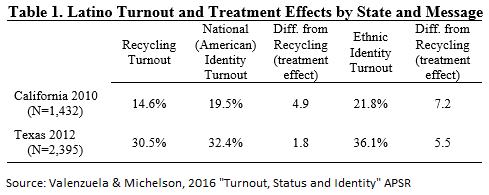Past research shows Latinos are more likely to vote and participate in politics when there is a Latino candidate on the ballot and when issues directly affecting the Latino community are at stake in the election, much like in the current election. This research suggests that ethnic solidarity drives participation. At the same time, dozens of experiments have found that get-out-the-vote (GOTV) efforts can effectively move Latinos to the polls (August 11, 2014 post), but these studies have found no differences between messages extolling ethnic solidarity and messages about civic duty or the closeness of an election. These competing results present a paradox: do ethnic attachments matter for Latino political participation, or not?
In our recent research, forthcoming in the American Political Science Review, we resolve this paradox using two experiments conducted in 2010 and 2012. We show that Latinos with a strong Latino or Hispanic identity are responsive to an ethnic identity appeal, while Latinos with a strong American identity are responsive to a national identity appeal.
We conducted our studies in carefully selected communities in Los Angeles County, California, and Hidalgo County, Texas, two areas with very large (> 75%) Latino populations that reinforce and strengthen Latinos’ ethnic attachments.
Registered Latino voters then received a live telephone call that encouraged them to vote. They were randomly assigned to hear one of three different messages.
In one message, which we called “ethnic identity,” subjects were told that the call was coming from the “Latino Voter Project,” was part of a campaign to turn out “Latino voters,” and was designed to make the “Latino community heard.” (In Texas, we replaced “Latino” with the more commonly used “Hispanic.”)
In another message, which we called “national identity,” Latino voters heard the same message — except that the organization was called the “American Voter Project,” and it was trying to turn out “American voters” to make the “American community heard.”
We also included a “placebo” message about recycling that we used as a baseline for comparing our effects.
After each election, we obtained official voting records from the county registrars to see who in the treatment and control groups actually turned out to vote.
As shown in Table 1, the GOTV appeals that cued their ethnic identity mobilized registered Latinos to turn out and vote more consistently than appeals that cued their national identity. In California, Latino registered voters who received the ethnic identity appeal were 7.2 percentage points more likely to vote than were those who received the recycling message, a significant and substantively large treatment effect, while those who received the national identity appeals were only 4.9 percentage points more likely to vote. We found similar results two years later in Texas.

More interesting are the subgroup results. In both experiments, we chose to study Latinos in adjacent communities with varying levels of economic resources. To figure out which Latinos within these communities had strong or weak ethnic identities, we looked at their neighborhood’s average household income; whether they were born in the U.S. or elsewhere; their most commonly used language; and how many years they’d been registered to vote. We expected Latinos with strong ethnic identities to come from lower income communities or to be immigrants who primarily spoke Spanish and had only been registered to vote for a few years or less.
Conversely, we expected Latinos who lived in better-off communities and who tended to have more contact with non-Latinos, who primarily spoke English, who were born inside the U.S., and who had been registered to vote for several years or more to be just as strongly attached to their American identity as they were to their ethnic identity.
In California, Latino ethnic identity appeals produced significant increases in turnout for all of our subgroups, consistent with the idea that Latino ethnic identity is quite strong in our overwhelmingly Latino contexts. At the same time, national identity appeals mobilized greater turnout only in the high resource community, and only among high acculturation and high political incorporation Latinos in these California communities.
Ali A. Valenzuela, Ph.D. is Assistant Professor of Politics and Latino Studies at Princeton University. Melissa R. Michelson, Ph.D. is Professor of Political Science at Menlo College. They co-authored a forthcoming research article in the American Political Science Review “Turnout, Status, and Identity: Mobilizing Latinos to Vote with Group Appeals”


